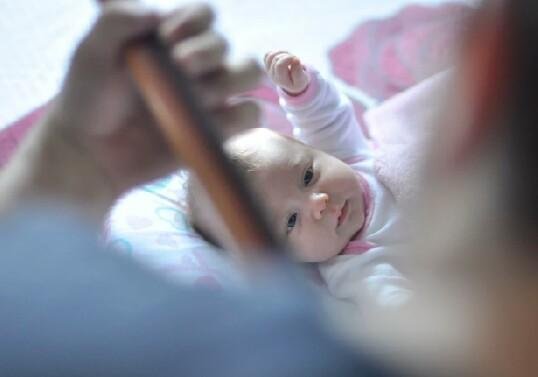
More and more reports appear in the media about the mental problems young mothers face. Campaigns call for more specialization to combat these disorders. What about young fathers?
At present, only women can be officially diagnosed with postnatal depression. In the psychological 'bible', the Handbook for the classification of mental disorders (DSM), we find the diagnosis 'peripartum depression'. This is a clinical depression that can occur at any time during pregnancy and up to four weeks after delivery. According to experts, this depression can even occur up to a year after delivery.
A postnatal depression does not differ much from a traditional depression. Again, this is a period of at least two weeks during which the patient struggles with negative thoughts and is unmotivated. Other symptoms are: poor sleep, restlessness, weight fluctuations, feelings of guilt, a feeling of worthlessness and thoughts of death. The main difference is that another person is involved in postnatal depression, namely the child.
In the long term, post-natal depression has a negative impact on the child. He or she suffers from development problems, problems with social interactions, relationship problems and other health problems.
7-20% of new mothers suffer from postnatal depression. Therapists usually assume that this depression is the result of changes in hormone levels after delivery. This is partly true, but there are many other factors that play a role in postnatal depression. Poverty, young age, lack of a social safety net and the trauma of childbirth for example. There comes the overwhelming sense of responsibility that new parents experience.
Depressed mothers often feel very guilty towards their baby. They are afraid of being condemned by society. As a result, at least 50% of women do not indicate that they have a problem. Others do not talk about it out of fear that they have to account for the social service.
More and more evidence
Men can also suffer from these symptoms. The difference is that there is no official diagnosis for postnatal depression in men. Studies from different countries such as Brazil, the US and the UK show that 4-5% of fathers feel depressed after the birth of their child. Other studies even claim that it concerns 10% of the fathers.
The cause of this depression in men is the same as in women. Yet there are additional complications when men suffer from post-natal depression. In general, men are less likely to seek help for their mental problems.
The social norm dictates that men must hide their emotions. This responsibility probably weighs heavier on fathers, because they want to take care of their families. Especially after the birth of their first child, men have to deal with many sudden changes. The income of the family decreases and the partner relationship also changes. These factors elicit depressive feelings.
It is therefore important to help both fathers and mothers during this period. A postnatal depression in the father can also damage the development of the child. Men seek help less quickly than women. In addition, therapists take the mental problems of the father less seriously than those of the mother. We need more evidence to show that new fathers earn as much help as new mothers.
Little tools
Health experts have for a long time not had the right tools to detect and treat mental problems after birth. Recent campaigns in the UK led to policy changes and better guidelines in this area. Nevertheless, the new guidelines of the National Institute for Health and Care Excellence (NICE) still do not say anything about the needs of fathers. According to a NICE spokesperson, the guidelines will not change as long as there is no evidence of postnatal depression in men. However, there are many actions to draw attention to this phenomenon. If we ignore hormonal factors, we see as many risk factors for postnatal depression in men as in women. It is time that we officially acknowledge this problem.